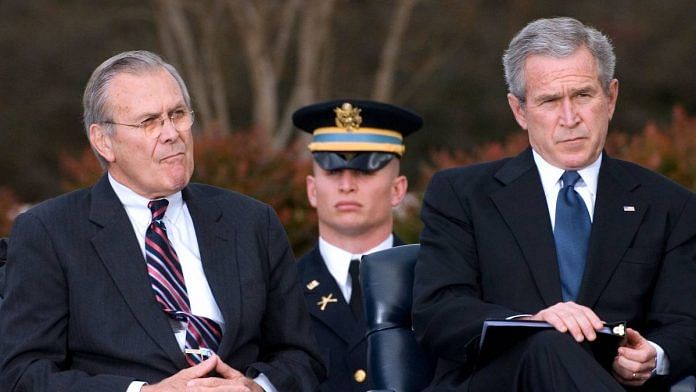New Delhi: Veteran American bureaucrat and former US Secretary of Defense Donald Rumsfeld, who passed away Tuesday at the age of 88, has had his imprint not just in Afghanistan and Iraq, but he also played a decisive role in the India-Pakistan relations during the period of Operation Parakram of 2001.
Operation Parakram was a 10-month long military stand-off between India and Pakistan, which was sanctioned by then Prime Minister Atal Bihari Vajpayee in response to the 13 December 2001 Indian Parliament attack carried out by the Jaish-e-Mohammed (JeM) and Lashkar-e-Taiba (LeT).
While India deployed a large number of troops at the Line of Control (LoC), ready to declare war against Pakistan in an effort to show New Delhi’s “coercive diplomacy“, the attacks never really materialised, thanks to the role played most actively by then US Secretary of Defence Rumsfeld, among others.
Operation Parakram, which is also seen as a precursor to the Balakot strikes, began right after the Parliament attack by the end of December 2001 and both the militaries stood eyeball-to-eyeball till October 2002.
With tensions rising as the threat of a nuclear war loomed large, the international community — still grappling with the 9/11 attacks in the US in September 2001 — left no stone unturned to calm the waters between India and Pakistan.
Rumsfeld, along with then US Deputy Secretary of State Richard Armitage, began playing the role of a peacemaker as tensions peaked following the Kaluchak terrorist attack on 14 May 2002 in Jammu and Kashmir.
By around June 2002, the crisis seemed to be going out of control, which is when Rumsfeld undertook a visit to India. Apart from him, then British PM Tony Blair and Foreign Secretary Jack Straw, US Secretary of State Colin Powell, Canadian Deputy PM John Manley, and Japanese Vice-Foreign Minister Seiken Sugiura all paid visits to India, urging New Delhi to exercise restraint.
Also read: Pakistan keeps making bad decisions with India. Its insecurity is hurting peace
When Rumsfeld met Vajpayee & Musharraf
As one of the primary figures of America’s foreign policy under the George W. Bush administration, Rumsfeld’s visit to India in June 2002 was seen as strategically significant.
During his visit, which he later called “constructive”, Rumsfeld met Vajpayee, his Indian counterpart George Fernandes, External Affairs Minister Jaswant Singh and National Security Advisor Brajesh Mishra.
“We feel that there are steps being taken which are constructive, and we must say that the leadership here in India has demonstrated their concern and their interest in seeing that things are resolved in an appropriate way,” Rumsfeld said.
His visit also found considerable praise from his boss, US President Bush, who said he was “pleased” with the “progress” made in diffusing tensions between India and Pakistan.
Rumsfeld was also credited for averting a war between New Delhi and Islamabad.
“There have been some hopeful signs … It’s not getting worse and that’s a good thing,” he told reporters at a conference during his visit to India.
At another press briefing in New Delhi, which he jointly addressed with Fernandes,
Rumsfeld said, “We discussed the crisis and the tension in the region between India and Pakistan.”
He said Pakistan was taking certain steps that the US was “certainly hopeful will go a long way towards lowering tensions and promoting a constructive dialogue between India and Pakistan.”
“President Bush, of course, has been in touch with the Prime Minister of India and the president of Pakistan,” he added.
Responding to a question on whether India should back out from Operation Parakram, Rumsfeld said, “India and Pakistan have to make these decisions. It’s not the United States that makes these decisions. It’s not any other country.”
Articulating the US’ position, he said, “I do not believe it is in either of their interests to stay for a long period at a state of high mobilisation.
“I think the tension is unhelpful to them, unhelpful to the world, and I’m hopeful that the leadership of those two countries will continue on the path they seem to be on — to attempt to find ways to either directly or indirectly discuss these matters, and that over the coming weeks and days we will see a relaxation of that tension and some dialogue take place that will lead to a peaceful resolution of the variety of issues that stand between those two countries.”
US support for monitoring infiltration from Pakistan
During his meeting with Vajpayee, Rumsfeld had assured India of US’ support to monitor infiltration from Pakistan into Kashmir as he believed that al Qaeda fighters whom America was chasing in Afghanistan were now hiding in the disputed region of Kashmir.
Following his India visit, Rumsfeld met then Pakistan President Pervez Musharraf, and made him commit to Islamabad cracking down on cross-border terrorism.
“He (Musharraf) has made a very firm commitment to everything he can do to limit infiltration across the Line of Control permanently,” he said.
(Edited by Manasa Mohan)
Also read: India playing the Taliban move won’t checkmate Pakistan



